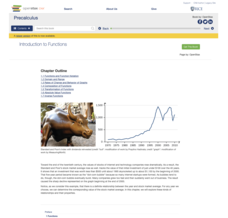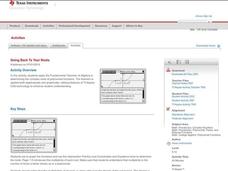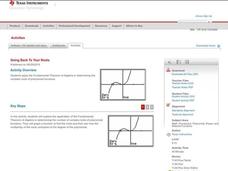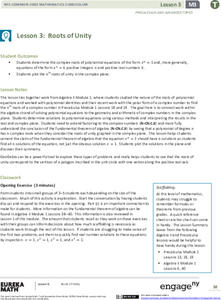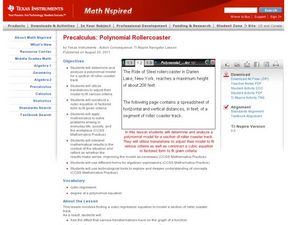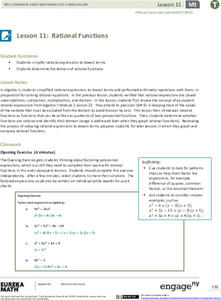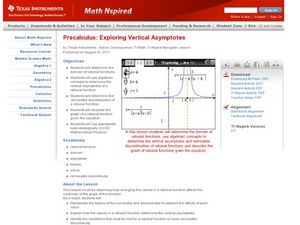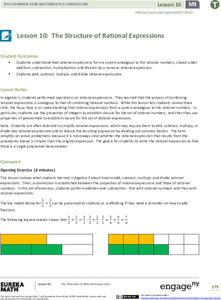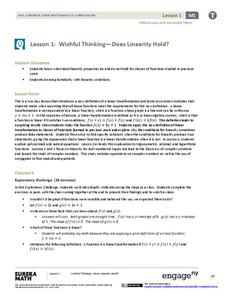EngageNY
Solutions to Polynomial Equations
Take a step back to Algebra II. The first lesson in a series of 23 asks scholars to remember working with quadratic equations with complex solutions. Pupils apply polynomial identities to complex numbers and work examples that show how...
Rice University
Precalculus
Take a step beyond Algebra 2. Learners use the eBook to learn concepts from the typical Precalculus course. Content starts off with a short review of functions in general and moves on to the basic functions, finishing up with more...
Curated OER
Going Back to Your Roots
Investigate the Fundamental Theorem of Algebra and explore polynomial equations to determine the number of factors, the number of roots, and investigate multiplicity of roots.
Curated OER
Graphical Analysis
Get out your TI-nspire graphing calculator and explore polynomials. Learners determine where a given polynomial are increasing or decreasing, find maximums, minimums, and zeros of polynomials, and discuss end behavior of polynomials....
Curated OER
Going Back to Your Roots
Who doesn't need to know the Fundamental Theorem of Algebra? Use the theorem to find the roots of a polynomial on a TI calculator. The class explores polynomials with one solution, no real solutions, and two solutions. This less lesson...
EngageNY
Polynomial, Rational, and Radical Relationships
This assessment pair goes way beyond simple graphing, factoring and solving polynomial equations, really forcing learners to investigate the math ideas behind the calculations. Short and to-the-point questions build on one another,...
EngageNY
Roots of Unity
Visualize the nth roots of unity. Pupils calculate the nth roots of unity and find all n roots. Learners plot the solutions in the complex plane and observe that they are the vertices of a regular n-gon inscribed in the unit circle....
Curated OER
Polynomial Rollercoaster
Learners relate polynomials to a rollercoaster track as they translate a graph around on a coordinate plane. They differentiate between different forms of algebraic expressions.
Curated OER
Chapter 4 Review Worksheet: Polynomial
In this polynomial worksheet, students write polynomial equations, determine the discriminant of equations, and find zeros of functions. This two-page worksheet contains 16 problems.
Curated OER
Eighty-Six Various Polynomial Function Problems
In this polynomial functions worksheet, learners solve eight-six various problems concerned with the degree, graph, intercepts, end behavior, and transformations of polynomial functions. Some of the problems are algebraic work and some...
EngageNY
End Behavior of Rational Functions
Connect end behavior to previous learning. Pupils connect finding the end behavior of rational functions to finding end behavior of polynomial functions. The 13th segment in a 23-part unit starts with finding the end behavior or power...
EngageNY
Rational Functions
Make a connection between rational expressions and rational functions. Pupils review simplifying and performing operations on rational expressions and recall what it means for two rational expressions to be equivalent based on their...
Curated OER
End Behavior of Polynomial Functions
Learners identify the end behavior of polynomial functions. In this algebra lesson plan, students graph different polynomials functions and find a correlation between exponents and function behavior. They identify the effect the leading...
Curated OER
Multiplicity of Zeros of Functions
Pupils identify the multiplicity of exponents as they graph polynomials. They write equations for a function given the zeros of the function and work backwards from solving equations.
Curated OER
Exploring Vertical Asymptotes
Scholars identify the domain of a rational function in this precalculus lesson. They identify the removable discontinuity and label what will make the denominator zero. Learners also describe properties of the graph as it relates to the...
Curated OER
Crossing the Asymptote
Students investigate graphs and their asymptotes. In this precalculus lesson, students examine the numerator and denominator of their rational functions. This helps them identify where and when the graph will cross its asymptote.
EngageNY
Exploiting the Connection to Trigonometry 2
The class checks to see if the formula for finding powers of a complex number works to find the roots too. Pupils review the previous day's work and graph on the polar grid. The discussion leads the class to think about...
EngageNY
Mid-Module 3 Assessment Task
Time to take a pulse check. The mid-module assessment allows pupils to check where their knowledge falls for the first portion of the module. The 10th resource in a series of 23 covers content from the binomial theorem to hyperbolas....
Curated OER
Finite Differences
Young mathematicians solve problems with polynomials. As they graph and analyze polynomial functions, learners define constant and finite, and determine the relationship between the constant set of differences and the slope of a linear...
EngageNY
The Structure of Rational Expressions
Find out when rational expressions are closed. Pupils review adding, subtracting, multiplying, and dividing with rational numbers to make the connections to operations with rational expressions. Using specific examples, learners notice...
Curated OER
Applications and Writing Functions
In this college level Pre-Calculus worksheet, students use polynomial and rational functions to solve application word problems. The three page worksheet contains forty-four problems. Answers are not included.
Rice University
Calculus Volume 1
Differentiate between calculus concepts. The beginning of a helpful calculus resource begins with a short review of functions and moves right into limits to define derivatives. The six-chapter resource continues with applications of...
EngageNY
Complex Numbers and Transformations
Your learners combine their knowledge of real and imaginary numbers and matrices in an activity containing thirty lessons, two assessments (mid-module and end module), and their corresponding rubrics. Centered on complex numbers and...
EngageNY
Wishful Thinking—Does Linearity Hold? (Part 1)
Not all linear functions are linear transformations — show your class the difference. The first lesson in a unit on linear transformations and complex numbers that spans 32 segments introduces the concept of linear transformations and...



